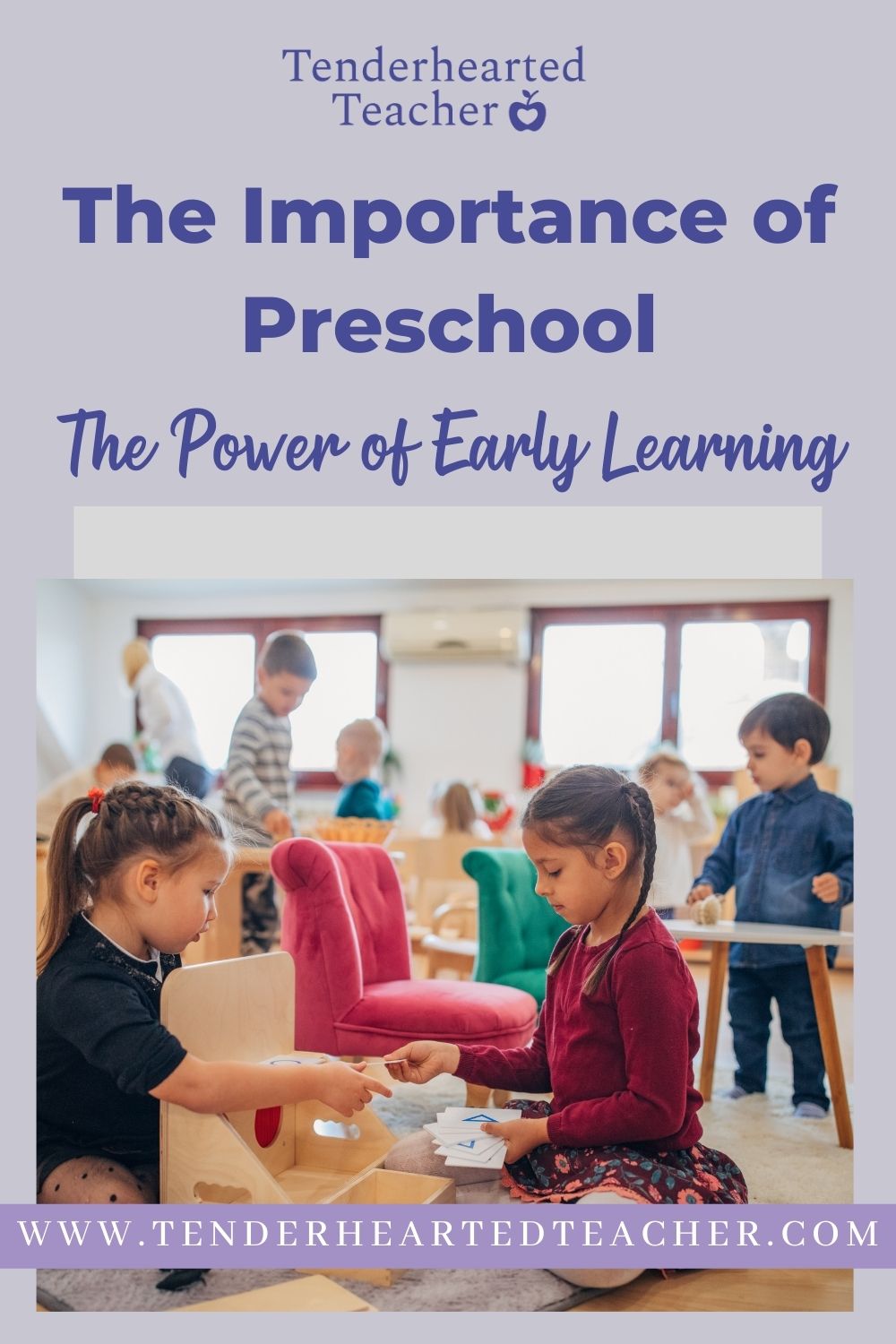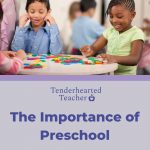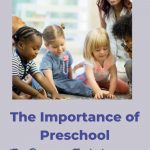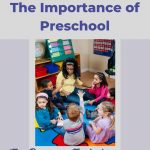
When most people reflect on the US education system they often think of the grade levels K through 12. But, as an early childhood educator, I love to discuss the importance of preschool programs. I’m hoping this post can provide parents and caregivers with a better understanding of the overall benefits and long term impacts of preschool.
What Can Parents and Caregivers Expect From Their Child’s Preschool Program?
Preschool programs do an excellent job of helping little ones to develop skills in several areas. These include cognition (or thinking skills,) language and communication, physical development, and social-emotional learning. Preschool classrooms are chock-full of valuable opportunities to have young students interact with their teachers and peers and learn new skills. For instance, children learn how to work and play collaboratively, cooperate, share, and take-turns. They also learn how to ask for help and communicate their wants and needs. Preschool also helps children learn to handle transitions as well as follow simple directions and routines. Ultimately, preschool can help to lay the foundation for all future learning. It plays an important role in preparing young children for kindergarten and their entire educational journey.
With that said, children learn the fundamentals of early literacy, math, and science in preschool. But, equally as important, they learn social-emotional and life skills that can set them up for future success. Here are the milestones I help my students reach as an early childhood educator.
What does a Typical Preschool Classroom Look Like?
No matter what curriculum a preschool uses (such as Montessori, High-Scope, Creative Curriculum, Tools of the Mind, or Reggio Emilia, etc.) the standard aim is the same. Early childhood programs strive to provide children with a safe and welcoming environment that fosters learning through hands-on experiences.
A typical high-quality preschool program will utilize a combination of instructional strategies and open-ended materials to enhance child development. For example, if you were to step into an effective preschool classroom you’d see children happily engaged with their teachers and peers in a print-rich environment. Students might be singing and dancing, reading books, playing with blocks or dolls, conducting science experiments, painting, etc. You’d also see children engaged in individualized learning as well as small and large group activities throughout the day. Some activities are teacher-led (like circle time) and some are student-directed (such as free-choice centers.)
Scholastic states that “preschool classrooms are often organized by centers or areas that are divided by different subjects and types of play. For example, a typical preschool classroom may have the following centers: reading, arts and crafts, water/sand table, building and math toys, and an area for pretend play. The school day is structured with both time for free play, during which children can choose which centers to play in, as well as structured schedules devoted to each subject.”
But, What Does the Research Say?
According to the Wall Street Journal, “Multiple studies show that going to preschool gives young children a leg up on all kinds of learning, not just academics but social skills, listening, planning and self-control.”
Additionally, NPR more recently released an article that reiterated this as well. A growing body of research found preschool programs can produce positive long-term outcomes for students who have access to them. For example, preschool education has been shown to decrease the likelihood of students to skip school, be suspended, and be placed in juvenile detention, etc. In addition, students with access to preschool were more likely to have higher graduation rates, enroll in college, and even earn more once they reached the workforce. Furthermore, there’s evidence that preschool positively impacts the development of important social-emotional skills as well.
So Why Did I Choose to Teach Preschool?
My passion to teach the littlest of learners came from the desire to make the biggest impact. I feel like my role as an early childhood educator can have a positive ripple effect on my students and their futures.
As a preschool teacher, I have the incredible responsibility of potentially shaping how my students feel about school and more importantly about learning. I can help to enhance my students’ futures by cultivating a healthy and positive educational experience early on.
Finally, education is a basic human right. It is fundamental in promoting opportunities for growth and success, not only on an individual level, but on a societal one as well. I’ve said it before. But, it bears repeating. Of course my goal as an educator (and a parent!) is to help children become good students. But, more importantly, I aim to help them be good humans. All of my professional experience has taught me one very important thing. Cultivating critical social-emotional skills like self-awareness, empathy, patience, mindfulness, etc. in early childhood can help create well-rounded adults capable of improving the world. Therefore, I believe that access to high-quality early childhood programs can lead to a better future for us all.
Now talk to me! Do you agree that preschool programs have a long-lasting positive impact? What do you feel is the importance of preschool? Share your comments and questions below.
Here Are Some Of My Related Posts about Preschool Learning:
- How Music and Movement Promote Development in Preschool
- Early Math with Blocks: How to Teach Your Preschooler Important Skills at Home
- The Importance of Play in Preschool: Learning with Fun and Games
SAVE TO PINTEREST




This post is so informative! It’s particularly eye opening as Pre K is not required in my state in order for them to start 1st grade. My son is 2 now and I had initially thought I would just skip over. Thanks for sharing this!
Thank you for your comment, Krystal! Yes, it’s extremely interesting that many states don’t require preschool or even kindergarten for that matter. Hopefully we will see a shift to having more access to early childhood programs in the future since there are so many proven benefits.
So funny that I just ran across this, since I was literally just telling someone I wouldn’t put our kids in preschool… partially because I never went to preschool. Definitely made me rethink some of that logic, and appreciated your breakdown on why it was important! Thank you for sharing 🙂
Your points make me re-consider my choice of sending kids to pre-school.
This post is fantastic and informative